You Get the Message? – Ashanti Linguist's Staffs
PRIMITIVE - Friday, September 25, 2015By Misaki Imagawa
Edited by Glen Joffe
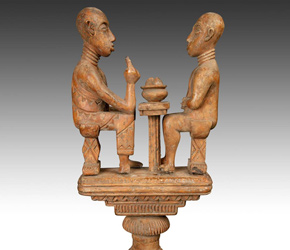 |
|
When the President stands at his podium and speaks, generally speaking, it’s pretty important and easy to hear. Modern media makes it so. Yet, think about it; historically, how often could the common people listen to their leaders speak? Back when there was no internet, television or radio, could a farmer or merchant even get close enough to hear their king’s words? In fact, most kings and queens didn’t even communicate directly with the public. It was the job of a spokesperson to get the word out to the people. Back in Roman times, newsreaders read edicts standing on pedestals at busy intersections. In contrast, in today’s America the press secretary is responsible for explaining the policies of the President and the reasons behind their actions. Every word is measured, and while humor may weave its way into a presentation, quality is usually measured by clarity and a careful explanation of the motivating factors. It’s rare that people praise the performance of the press secretary; but they would upon hearing the artful and eloquent speeches of those who speak on behalf of the Ashanti Kings and Chiefs in West Africa.
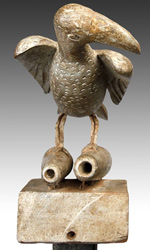 |
|
The Ashanti kingdom, located in present day Ghana, consists of a number of smaller chiefdoms; each chief with his own royal court and set of dignitaries. Unlike the present day, where leaders address the people through modern media; in the past, Ashanti chiefs never spoke directly to their people. The duty of addressing the people belonged to the Okyeame (pl. Akyeame), or linguist, also known as the orator. Because the Ashanti culture did not have its own written language, oral traditions were highly valued and practiced extensively. Historical accounts, traditions and sayings were all handed down from one generation to the next simply by word of mouth. In particular, proverbs – simple meaningful sentences – played an enormous role in Ashanti culture, where there are over 3,600 proverbs dealing with all aspects of life and covering just about every human situation and condition. Each proverb is embedded with the accumulated wisdom of the Ashanti people. The responsibility of the Okyeame was to master all these proverbs, axioms and stories, and doing so required an impressive command of the language. It was his primary duty to recast the chief’s pronouncements as proverbs, to convey the meaning of the chief’s words in a witty, appealing way to instruct, inform, educate and entertain the people. However, the Okyeame was much more than a wordsmith or the reciter of little moral snippets. His vast knowledge and wisdom – especially of the wisdom contained in the proverbs – made him an invaluable adviser to the chief, often requiring him to act as diplomat, counselor, legal aid, historian, ambassador, and even a military attaché. There is one Ashanti proverb that says it all: “There are no bad kings, only bad linguists.”
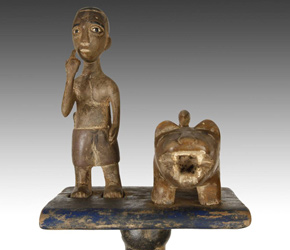 |
|
Today, the role of the linguist has changed slightly, but the linguist still remains an important official and advisor to the chief, especially in smaller villages where traditional customs are still maintained and honored. In the past, it could be said that the linguist was similar to our press secretary in America – a faithful defender of the chief’s policies and pronouncements capable of explaining and enriching his words as a palliative to the population. Now, the linguist serves as an intermediary between the chief and other court officials including village elders. For example, if someone wants to ask something of the court priest, they would address their remarks to the linguist who would pass them on and return the reply. The linguist has essentially become a buffer between court officials including the chief and the constituency. It is still an important role, for severe edicts may be paraphrased in palatable digestive ways and imperceptible utterances may be clarified for the benefit of all. The proverbs live on with pomp and circumstance, clothing pronouncements in words and important physical regalia.
As one of the most important officials of the royal court, the Okyeame holds a special form of court regalia when he speaks. Known simply as an linguist’s staff, it is a carved work of art with a detachable finial. Some might say it is the equivalent of a king’s scepter. While the development of the staff was directly influenced by European canes, the finial artwork at the top is a unique art form inspired by Ashanti oral traditions: each and every staff was made as a visual representation of one or a set of the thousands of Ashanti proverbs. The staffs were carved from wood and although most were painted some were accented with gold leaf. In the Ashanti Kingdom gold was considered an embodiment of sunlight and life’s vital force. It symbolized wealth and was an integral part of royal court regalia. In fact, the Ashanti Kingdom was also known as the Kingdom of Gold before European colonization. Nonetheless, most staffs are painted as gold began to disappear from the kingdom during that time.
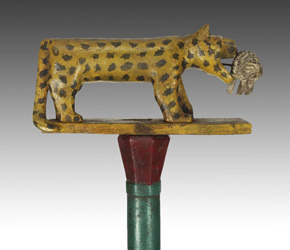 |
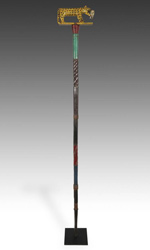 |
||
Many linguists’ staffs illustrate the chief’s legitimacy, power and insight. The proverbs they depict usually confirm the power of the chief and his wisdom. Some carvings may be as straightforward as to depict the king being crowned, while others may portray the chief cradling an egg, reflecting the chief’s devotion to protecting and nurturing his people. A bird carrying a keg in its beak or cannons in its talons is a direct reference to the proverb: “The bird who always travels with cannons and gunpowder.” It means a good chief must always be prepared for war. A tiger, leopard or any other feline predator standing over or holding a porcupine praises the king’s keen observation and insight because, “Only a leopard knows when the porcupine’s quills are down.”
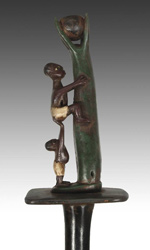 |
|
The rooster and the hen are also popular subjects in Ashanti linguistics. One proverb states, “The hen knows when it is dawn but leaves it to the rooster to announce.” This refers to the decision making power of the chief (rooster) and the wisdom he receives from the elders and linguists (hen). It ultimately asserts that one should know their own place. A single image or motif can in fact be layered in reference to multiple proverbs. The rooster and the hen can also stand for the proverb, “The cock does not wait for the hen to crow,” a reference to the chief taking the initiative. Likewise, a person seen climbing a tree with the help of a second person pushing from below refers to the words, “One who climbs a good tree always gets a good push.” This could mean that a chief with good and fair intentions will be supported by his people, but it could just as well be applied to the actions of anyone else.
Another well-known finial decoration features two people flanking a large spider web. The proverb states, “No one goes to the house of Ananse to teach him wisdom.” Ananse, a spider in popular folktales, is said to have taught the Ashanti people wisdom and the skills to weave – not only their beautiful Kente cloths, but also the ability to weave words, stories and proverbs. This visual connection to Ananse was thus highly popular among the linguists and served as reminders that the Akyeame should not be challenged within their domain, for they are the master weavers.
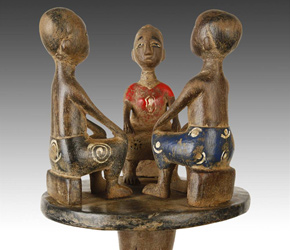 |
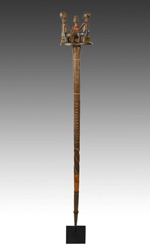 |
||
Proverbs of warnings and moral lessons are also featured atop linguist staffs. The image of a tiger standing over a human with the hunter’s rifle in its mouth cautions, “It is better not to have fired at all than to fire and only wound the beast.” It asks us to consider our actions before embarking on any particular course. On the dangers of naiveté, the Ashanti say, “The boy does not know the lion.” A young boy standing carelessly next to a lion speaks volumes. Three heads or three people sitting together personify the proverb, “One head cannot make a council.” It suggests three heads are better than one, meaning discussion with intention is good. Lastly, two people sitting together at a table with food dishes out the lesson: “Food is for the man who earns it, not for the hungry man.” The message here is simple and universal: work hard.
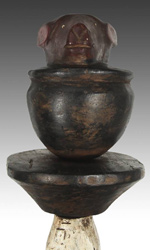 |
|
From words of wisdom and caution to lessons of morality and integrity; from praises for chiefs and dignitaries to criticism of individual behavior, orator’s staffs present their own powerful visual language. Consider President Obama; it took months of nationwide campaigning, television commercials, and internet “PRing” to spread his famous slogan, “Yes we can.” In the Ashanti Kingdom, a single finial on an orator’s staff can make just as strong an impression and be just as thought-provoking without any technological communication. The Akyeame are more than tribal press secretaries. They are teachers, advisers and sages, but above all they are artists of the spoken language. The staffs they carry, their emblems of office, are true works of art commemorating and reinforcing the proverbs they recite; and their recitations – a sort of performance art – are not really something modern press secretaries can boast about.
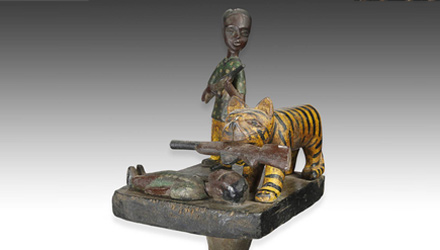 |